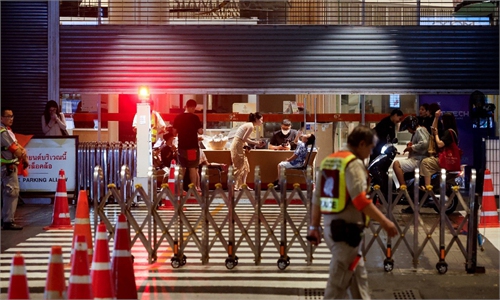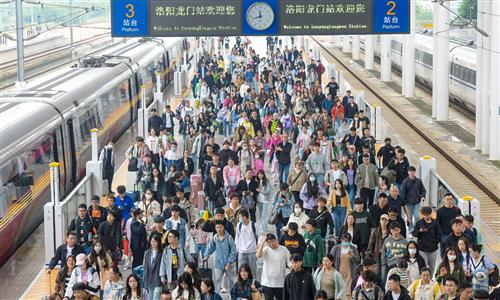China's sees 11.81m inbound, outbound trips during Golden Week
Cross-border travel sees strong recovery, but vast room for further growth: industry insider

Passengers wait at the Guiyang North Railway Station on October 6, 2023. On the last day of the Mid-Autumn Festival and National Day holidays, the railway station in Guiyang, Southwest China's Guizhou Province, welcomed the peak for returning passengers. Photo: VCG
China's saw a total of 11.81 million inbound and outbound trips during the recent eight-day Mid-Autumn Festival and National Day holidays, reaching 85.1 percent of pre-pandemic levels. Industry insiders say this is a strong recovery for cross-border trips, but at the same time there is still vast room for improvement, especially for inbound trips, as such trips are currently being held back by the slow resumption of international flights, geopolitical rifts and other factors.
The average daily number of inbound and outbound trips reached 1.47 million during the holiday period, which ended on Friday, the National Immigration Administration said on Saturday.
The number is 2.9 times that of the same period in 2022, yet only stands at 85.1 percent of the same period in 2019.
The data is seen as a sign that cross-border trips have been experiencing a strong recovery since China relaxed COVID-19 restrictions earlier in 2023, yet the growth still pales in comparison with domestic travel.
During the eight-day holidays, 826 million domestic tourist trips were made in the country, an increase of 71.3 percent from 2022 and a rise of 4.1 percent from 2019, the Ministry of Culture and Tourism said on Friday.
Before the holidays, the government rolled out a slew of preferential policies to stimulate inbound and outbound trips, including optimized visa applications for foreigners traveling to the country and announcing a third resumption of outbound tour group services to 78 countries and regions.
There is still room to further stimulate cross-border trips, Jiang Yiyi, deputy head of the School of Leisure Sports and Tourism at Beijing Sport University, told the Global Times, citing reasons such as the slow recovery of international flights, as well as geopolitical rifts.
During the holiday, 12,000 flights were made to other countries, the Hong Kong and Macao special administrative regions, and the island of Taiwan, only half that of 2019, but an increase of 918 percent compared with 2022, data from Chinese flight tracking platform Feichangzhun showed on Saturday.
As for inbound trips, Jiang said that the government can make digital payment easier for foreign tourists and provide services to erase language barriers, as an "influx of foreign tourists will not only stimulate the tourism sector, but also help boost service, trade and help promote our national image."
Destinations of choice for Chinese tourists during the Golden Week period continued to include Thailand, Singapore, Malaysia and South Korea. Notably, long-haul international destinations such as Switzerland, Spain, Turkey, the UK, and France experienced the fastest growth in tourist numbers compared with the Labor Day holidays in May, Ctrip, one of China's largest online travel agencies, told the Global Times in a statement.
Many travel agencies revealed that apart from traditional favored destinations in Southeast Asia and Europe, Saudi Arabia, Turkey, Iran and Kenya became surprisingly favored destinations for this vacation period.
Turkey has moved up quickly to become the most popular travel destination for Chinese on Mafengwo, China's largest online travel information-sharing platform. Most searches and consultations on this website focus on self-driving tours and hotels in Turkey, as well as Turkish food.
A Shanghai resident surnamed Xie told the Global Times that she spent more than 40,000 yuan ($5,480) on a trip to Kenya this holiday. "Applying for visas to Europe is a headache (Chinese who travel to Kenya need only e-visa or visa on arrival); Southeast Asian countries were probably packed during the holiday… I was also concerned about discrimination and crime abroad," said Xie, adding that the Kenya safari she took was a "brand new experience."
Xie's concerns were not unfounded.
One Chinese national has been killed and another injured, the Chinese Embassy in Thailand confirmed late Tuesday night, after a shooting incident that left two dead and five injured at one of the most popular shopping malls in Thailand on Tuesday afternoon.
On Friday, a Chinese woman fell to her death from the 10th floor of a hotel in the Karon sub-district of Phuket Province in Thailand. The cause of her death remains shrouded in mystery, local media reported.
In September, the Thai government announced a temporary tourist visa exemption scheme for Chinese and Kazakh travelers to boost tourism.
Thirty-year-old Huo who lives in Beijing traveled to Thailand this holiday and returned on Monday. She told the Global Times that the temporary visa exemption made her trip easier and local restaurants and hotels are being extra friendly to Chinese tourists. But she admitted that those incidents had an impact on her, "safety remain the utmost when comes to foreign trips," said Huo.
After the shooting, Thailand Prime Minister Srettha Thavisin said Chinese visitors are always welcome in Thailand, adding that security measures will be stepped up to prevent any incidents in the future, local media reported on Saturday.



